08 Nov 2023 - {{hitsCtrl.values.hits}}
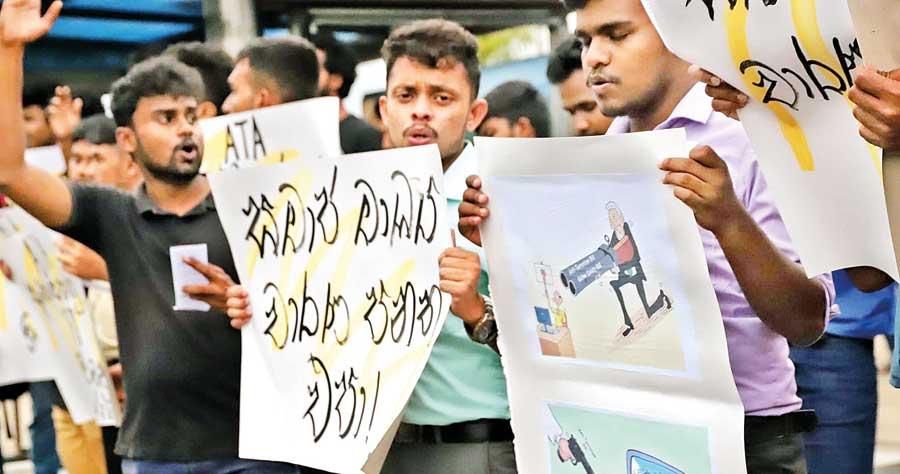
Protest demanding the withdrawal of the ATA and Online Safety Bill, organised by the Law and Society Trust
The Supreme Court’s determination that the provisions of the proposed Online Safety Bill are NOT inconsistent with the Constitution and can be passed by a simple majority following committee stage amendments on certain clauses was conveyed in parliament on November 7 (Tuesday). This determination was issued in response to 45 fundamental rights petitions that were filed against the Bill. Civil society organisations, legal practitioners, journalists and many individuals raised their concerns over the proposed Bill which would further infringe their right to freedom of expression, opinion, criticism, dissent and public debate.
following committee stage amendments on certain clauses was conveyed in parliament on November 7 (Tuesday). This determination was issued in response to 45 fundamental rights petitions that were filed against the Bill. Civil society organisations, legal practitioners, journalists and many individuals raised their concerns over the proposed Bill which would further infringe their right to freedom of expression, opinion, criticism, dissent and public debate.
Choosing democracy over dictatorship
The government appeared to be in a rush to pass the Anti-Terrorism Act (ATA) and the Online Safety Bill ever since it was tabled in Parliament. But a majority of professionals believe that these two laws will curb the fundamental rights of people which they are entitled to by the Constitution. “What we see is a real threat to discourage efforts and repress criticism, dissent and public debate,” said Prof. Savitri Goonesekere, jurist and an international expert on the rights of children at an event titled ‘No Shut Up Laws’ organised by the Lawyers Collective, civil society and several other organisations.“The essence of democracy is that law making should be consultative.
We have seen this especially in the drafting of the Right to Information Act and the Domestic Violence Act. We don’t know in what environment and context these laws have been drafted and they set the norms and standards which undermine the foundation of democracy. The government is already engaged in policies which have imposed many hardships on people. The voice of protest has been articulated on the streets and on social media.These laws are an effort to silence people’s voices and deny the people’s right to participate and make their voices heard in matters of governance. Lawmaking can either protect or violate the fundamental rights of people.
“Sadly I recall being on a platform with Upul Jayasuriya, talking about Yahapalanaya and good governance and today we are again engaged in that discourse. Do we know what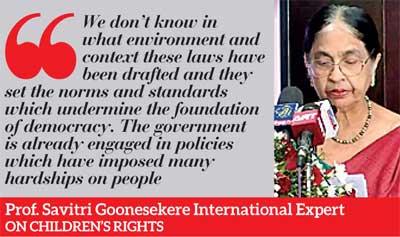 democracy is?
democracy is?
The Aragalaya was a strong voice to say we want democracy and system change. So we know what a democracy is. Contrast that with dictatorship. What does a dictatorship do? It is absolutely the reverse and what it does is it destroys the balance between the institutions of governance; legislature, Parliament, courts and the Executive. The balance between these three institutions is the foundation of democracy because it engages the social contact and the government where allegiance is based on trust, on the capacity to fulfill and protect the rights of people. In a dictatorship there is this dangerous phenomenon of a vision of a single leader which encourages that leader to perceive that they are the fount of wisdom, the only person who can provide the answers which makes the tendency to law-make and say “you shut up and you sit down” and that then destroys the very accountability of the legislative process to the people,” Prof. Goonesekere warned.
“Democracy will survive only if we fight for it and for that we need a partnership of citizenry, of professionals etc to say that we want a democracy and not autocracy or dictatorship in this country. We cannot have economic growth without righteous governance that is respectful of the rights ofa sovereign people as mentioned in the Constitution,” she said.
Law experts and activists see the need to awaken the people on the importance of the right to freedom of expression
A call to rally against the ‘Shut Up’ culture
The government has taken many efforts to curtail the people’s right to freedom of expression, right of assembly, protest etc. “Over the past year we have seen a rise in this ‘Shut Up’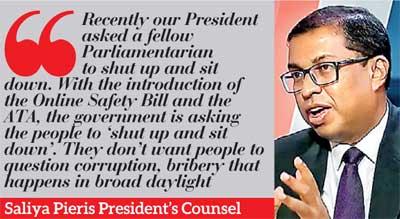 culture,” said Saliya Pieris, President’s Counsel and former President of the Bar Association of Sri Lanka. “Recently our President asked a fellow Parliamentarian to shut up and sit down. With the introduction of the Online Safety Bill and the ATA, the government is asking the people to ‘shut up and sit down’. They don’t want people to question corruption, bribery that happens in broad daylight. People shouldn’t question the government’s solutions to curb the economic crisis. This is why we decided to fight against this shut up culture.
culture,” said Saliya Pieris, President’s Counsel and former President of the Bar Association of Sri Lanka. “Recently our President asked a fellow Parliamentarian to shut up and sit down. With the introduction of the Online Safety Bill and the ATA, the government is asking the people to ‘shut up and sit down’. They don’t want people to question corruption, bribery that happens in broad daylight. People shouldn’t question the government’s solutions to curb the economic crisis. This is why we decided to fight against this shut up culture.
“We have to stand against these ‘Shut Up’ laws because during the past year nobody voiced their opinions when this country’s economy was in turmoil. When we questioned why they can’t talk in public, they expressed concerns. A doctor who had an interview regarding the corruption in the health sector was sacked. If people’s rights are to be protected it is paramount to protect their right to freedom of expression. The right to freedom of expression is the matrix of all other rights. It in fact lays the foundation for the right to think, equity, religious freedom and so on,” said Pieris.
He further said that the Courts cannot provide solutions to all the issues. “The Courts will check the constitutionality of Bills. But its consequences, the practicality and its pros and cons may not be checked in detail. Therefore we have to think of a mechanism that goes beyond courts. We need to awaken the people on the importance of the right to freedom of expression. It is the Parliament that will pass these laws and they too should be aware of the consequences. There have been instances when previous governments sealed media houses and censored important information from reaching out to the public. These laws will eventually be applied on ruling party politicians if they sit in the opposition one day. We don’t see the international community and the corporate sector standing against repressive laws. But it is a must that we keep on fighting until the government revokes both these laws,” he explained.
Critics points out that these laws will eventually be applied on ruling party politicians if they sit in the opposition one day
Civilian intervention sought to defy repressive laws
M. A. Sumanthiran, President’s Counsel and MP, in his comments said that the Aragalaya brought about a change in governance. “The people’s voices couldn’t be contained and nobody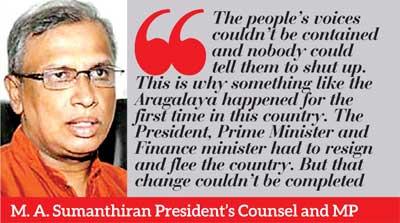 could tell them to shut up. This is why something like the Aragalaya happened for the first time in this country. The President, Prime Minister and Finance minister had to resign and flee the country. But that change couldn’t be completed as there was a hijacking of that movement of the people. To date it is that false majority that lost the people’s mandate that is ruling the country. This is why it is in this Parliament that these laws are being introduced. The government is headed by a President who doesn’t have a mandate, who is held up by a parliament that has lost its mandate and so therefore it is necessary for them to silence the people; to ensure that no one rises up or expresses their opinion,” said Sumanthiran.
could tell them to shut up. This is why something like the Aragalaya happened for the first time in this country. The President, Prime Minister and Finance minister had to resign and flee the country. But that change couldn’t be completed as there was a hijacking of that movement of the people. To date it is that false majority that lost the people’s mandate that is ruling the country. This is why it is in this Parliament that these laws are being introduced. The government is headed by a President who doesn’t have a mandate, who is held up by a parliament that has lost its mandate and so therefore it is necessary for them to silence the people; to ensure that no one rises up or expresses their opinion,” said Sumanthiran.
He further said that whatever that is sought to be achieved through the Online Safety Bill can be achieved by a law that exists today; the Temporary Provisions Act. “It has been in existence for 44 years and is sufficient to repress and get people to shut up. It monitors online behaviour and there are many cases pending under the Prevention to Terrorism Act (PTA). There is a ruse that the government is using, they have brought out a law to repeal the PTA and replace it, we express our opposition to that new bill and they will say they will withdraw it. But all the while that notorious PTA is in use. This has happened thrice. Even without the Online Safety Bill the PTA is still able to repress and suppress people’s opinions,” he said.
In conclusion he said that the fight must continue to repeal the PTA because the PTA can achieve all that these proposed laws can achieve. “We need to initiate a civil disobedience campaign because laws might be passed; laws might say you can’t speak and you can’t even think! Therefore, we must be there to defy those laws,” opined Sumanthiran.
Power of citizen journalism
Media has always been considered the fourth pillar of democracy and the fifth include social media as well as the internet. As a result social media is also considered important. “Apart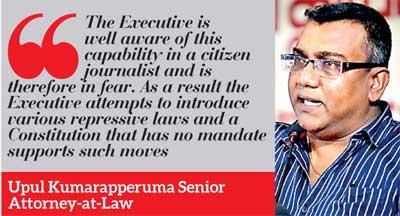 from the mainstream media, today there’s a new trend of citizen journalism,” said Senior Attorney-at-Law Upul Kumarapperuma. “The benefit of a citizen becoming a journalist is the fact that he has the ability to study any issue at the grassroots level. Therefore his expression on media will be stronger than that of a normal journalist. The citizen journalist has a power to mobilize more people. The aragalaya is one example. The Executive is well aware of this capability in a citizen journalist and is therefore in fear. As a result the Executive attempts to introduce various repressive laws and a Constitution that has no mandate supports such moves. We saw how the ICCPR Act has been misused and abused. Many of its interpretations have been subjective and it has been applied selectively on people that they need to hunt on. Over the past 13 years there have been many instances where there was religious disharmony. But none of the perpetrators have been questioned or apprehended using the ICCPR Act. On the contrary it was used to silence artistes for instance. Therefore we need to condemn the PTA as a society. Irrespective of the leader that assumes power, there shouldn’t be space left for anybody to implement repressive laws of this nature,” said Kumarapperuma.
from the mainstream media, today there’s a new trend of citizen journalism,” said Senior Attorney-at-Law Upul Kumarapperuma. “The benefit of a citizen becoming a journalist is the fact that he has the ability to study any issue at the grassroots level. Therefore his expression on media will be stronger than that of a normal journalist. The citizen journalist has a power to mobilize more people. The aragalaya is one example. The Executive is well aware of this capability in a citizen journalist and is therefore in fear. As a result the Executive attempts to introduce various repressive laws and a Constitution that has no mandate supports such moves. We saw how the ICCPR Act has been misused and abused. Many of its interpretations have been subjective and it has been applied selectively on people that they need to hunt on. Over the past 13 years there have been many instances where there was religious disharmony. But none of the perpetrators have been questioned or apprehended using the ICCPR Act. On the contrary it was used to silence artistes for instance. Therefore we need to condemn the PTA as a society. Irrespective of the leader that assumes power, there shouldn’t be space left for anybody to implement repressive laws of this nature,” said Kumarapperuma.
Concerned professionals in the country opine that it is the Parliament that will pass these laws and they too should be aware of their consequences
Creating the right environment for reforms
Speaking at the event, Executive Director of Transparency International Sri Lanka Nadishani Perera said that corruption is the abuse of power for personal benefits. “Transparency and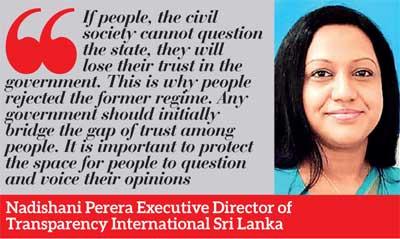 accountability are two key aspects that would prevent this abuse of power. If a government is transparent and accountable then people should have access to information as well as the freedom to express their views. The IMF has made it clear that in order to bring the economy back to normal there needs to be an improvement of governance. If people, the civil society cannot question the state, they will lose their trust in the government. This is why people rejected the former regime. Any government should initially bridge the gap of trust among people. It is important to protect the space for people to question and voice their opinions. There will be no reforms implemented if the right environment is not created.”
accountability are two key aspects that would prevent this abuse of power. If a government is transparent and accountable then people should have access to information as well as the freedom to express their views. The IMF has made it clear that in order to bring the economy back to normal there needs to be an improvement of governance. If people, the civil society cannot question the state, they will lose their trust in the government. This is why people rejected the former regime. Any government should initially bridge the gap of trust among people. It is important to protect the space for people to question and voice their opinions. There will be no reforms implemented if the right environment is not created.”
08 Jan 2025 1 hours ago
08 Jan 2025 2 hours ago
08 Jan 2025 4 hours ago
08 Jan 2025 5 hours ago